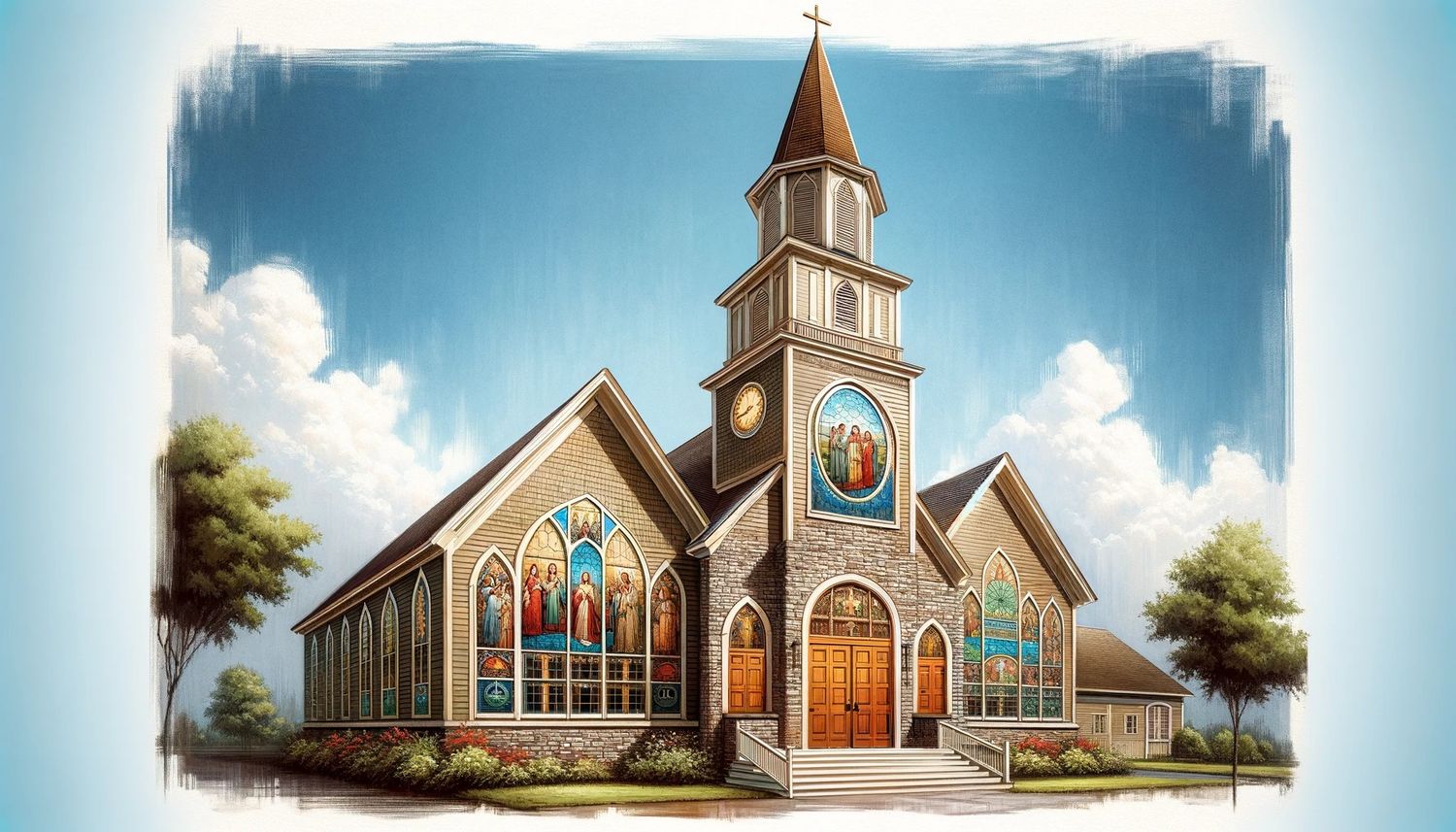Home>Theology and Spirituality>What Are The Ordinances Of The Baptist Church


Theology and Spirituality
What Are The Ordinances Of The Baptist Church
Published: February 20, 2024
Peter Smith, Editorial Director at Christian.net, combines deep insights into faith, politics, and culture to lead content creation that resonates widely. Awarded for his contributions to religious discourse, he previously headed a major organization for religious communicators, enhancing dialogue on faith's societal impacts.
Discover the significance and practice of Baptist Church ordinances. Explore the theological and spiritual aspects of baptism and communion. Gain insight into the beliefs and traditions of the Baptist faith.
(Many of the links in this article redirect to a specific reviewed product. Your purchase of these products through affiliate links helps to generate commission for Christian.net, at no extra cost. Learn more)
Introduction
The ordinances of the Baptist Church are fundamental practices that hold significant spiritual and communal importance within the faith. These ordinances, also known as sacraments in some Christian traditions, serve as visible symbols of the believers' relationship with God and their commitment to the body of Christ. They are not merely symbolic rituals but are deeply rooted in the teachings of Jesus Christ and serve as a means of grace and spiritual nourishment for the faithful.
The Baptist Church recognizes two primary ordinances: baptism and the Lord's Supper (also referred to as communion or the Eucharist). Each of these ordinances carries profound spiritual significance and is observed with reverence and solemnity by the members of the Baptist community. Additionally, the Baptist Church also places emphasis on church membership and ordination as essential aspects of its religious practices.
As we delve into the exploration of these ordinances, it is important to recognize that they are not mere traditions or customs but are deeply intertwined with the core beliefs and values of the Baptist faith. They serve as a tangible expression of the spiritual truths and principles that guide the lives of believers, fostering a sense of unity and shared identity within the community of faith.
The ordinances of the Baptist Church are not static rituals but living expressions of faith that continue to shape and enrich the spiritual journey of individuals and the collective body of believers. Through the observance of these ordinances, the Baptist Church seeks to honor the teachings of Jesus Christ, embrace the legacy of the early Christian church, and nurture a vibrant and authentic faith experience for its members.
In the subsequent sections, we will explore each of these ordinances in depth, seeking to understand their significance, historical context, and the profound impact they have on the spiritual lives of those who partake in them. Let us embark on this enlightening journey to gain a deeper appreciation for the ordinances of the Baptist Church and their enduring relevance in the lives of believers.
Baptism
Baptism holds a central position in the religious practices of the Baptist Church, symbolizing the believer's identification with the death, burial, and resurrection of Jesus Christ. It is a profound and sacred rite that signifies the individual's commitment to Christ and their public declaration of faith. The act of baptism is deeply rooted in the teachings of Jesus, as evidenced in the Gospel of Matthew, where Jesus commands his disciples to baptize believers in the name of the Father, the Son, and the Holy Spirit.
In the Baptist tradition, baptism is reserved for those who have made a personal profession of faith in Jesus Christ. It is not merely a ritual of initiation into the church but a deeply personal and spiritual expression of one's faith and devotion. The mode of baptism in the Baptist Church typically involves immersion in water, symbolizing the believer's identification with Christ's death and resurrection. This immersion signifies the cleansing of sin and the emergence of a new life in Christ, reflecting the transformative power of the gospel.
Baptism also serves as a public testimony of one's faith before the church community, signifying a commitment to live a life in accordance with the teachings of Jesus Christ. It is a joyous occasion that is celebrated by the congregation, as it marks the spiritual rebirth and initiation of the believer into the body of Christ. The act of baptism is a powerful and symbolic representation of the believer's union with Christ and their participation in the redemptive work of salvation.
Furthermore, baptism is not merely a one-time event but an ongoing spiritual journey. It signifies the beginning of a life dedicated to following Christ and growing in faith. The Baptist Church emphasizes the significance of baptism as a foundational step in the believer's spiritual walk, marking the commencement of a life lived in obedience to the teachings of Jesus Christ.
In essence, baptism in the Baptist tradition is a sacred and transformative experience, symbolizing the believer's union with Christ, their public declaration of faith, and their commitment to a life of discipleship. It is a deeply meaningful and spiritually enriching ordinance that continues to hold profound significance within the Baptist faith, shaping the identity and spiritual journey of believers across generations.
The Lord's Supper
The Lord's Supper, also known as communion or the Eucharist, holds a central and sacred position within the religious practices of the Baptist Church. It is a deeply meaningful and spiritually enriching ordinance that commemorates the sacrificial death of Jesus Christ and celebrates the profound significance of his atoning work on the cross. The observance of the Lord's Supper is rooted in the teachings of Jesus Christ, as recorded in the Gospels, where he instituted this sacred practice during the Last Supper with his disciples.
In the Baptist tradition, the Lord's Supper is a solemn and reverent occasion that serves as a tangible expression of the believer's union with Christ and their participation in the redemptive work of salvation. The elements of bread and wine (or grape juice) hold profound symbolic significance, representing the body and blood of Jesus Christ, which were offered as a sacrifice for the forgiveness of sins. As believers partake of the bread and the cup, they are reminded of the selfless love and redemptive grace extended to humanity through the life, death, and resurrection of Christ.
The act of participating in the Lord's Supper is a deeply personal and communal experience within the Baptist Church. It serves as a time of reflection, repentance, and spiritual renewal, as believers come together to remember and proclaim the Lord's death until he comes again. The observance of the Lord's Supper fosters a sense of unity and shared identity within the community of faith, as believers gather around the communion table to partake in this sacred ordinance.
Furthermore, the Lord's Supper is a tangible expression of the believer's ongoing fellowship with Christ and with one another. It serves as a powerful reminder of the spiritual nourishment and sustenance that believers receive through their relationship with Christ, as well as the bond of love and fellowship that unites them as members of the body of Christ. The observance of the Lord's Supper is a deeply enriching and transformative experience that continues to shape the spiritual journey and communal life of believers within the Baptist tradition.
In essence, the Lord's Supper is a sacred and solemn ordinance that holds profound spiritual significance within the Baptist Church. It serves as a tangible expression of the believer's union with Christ, their participation in the redemptive work of salvation, and their communion with the body of Christ. The observance of the Lord's Supper continues to be a source of spiritual nourishment, renewal, and communal unity for believers across generations, embodying the enduring relevance and significance of this sacred practice within the Baptist faith.
Church Membership
Church membership holds a significant place within the framework of the Baptist Church, serving as a vital expression of commitment, accountability, and communal belonging among believers. It represents a formal and intentional acknowledgment of an individual's dedication to the body of Christ and their active participation in the life and mission of the church community.
In the Baptist tradition, church membership is not merely a formality but a deeply meaningful and spiritually significant covenant between the believer and the local congregation. It signifies a voluntary and deliberate decision to align oneself with a community of faith, to contribute to its spiritual vitality, and to participate in its collective worship, fellowship, and ministry endeavors.
Church membership also entails a mutual commitment between the individual believer and the church body. It involves a pledge of support, encouragement, and accountability, as well as a willingness to actively engage in the life of the church, contribute one's gifts and talents, and participate in the shared mission of spreading the gospel and serving the needs of the community.
Furthermore, church membership fosters a sense of belonging and spiritual connectedness within the community of faith. It provides a supportive and nurturing environment where believers can grow in their faith, receive pastoral care and guidance, and cultivate meaningful relationships with fellow members. The church, in turn, commits to providing spiritual leadership, pastoral care, and opportunities for spiritual growth and service to its members.
The act of formalizing church membership is a significant milestone in the spiritual journey of a believer. It signifies a desire for deeper spiritual engagement, a commitment to spiritual growth and discipleship, and a recognition of the importance of communal worship, fellowship, and mutual edification within the body of Christ.
In essence, church membership in the Baptist tradition is a sacred and transformative covenant that embodies the believer's commitment to the local church, their participation in the communal life of faith, and their dedication to advancing the kingdom of God. It is a tangible expression of unity, accountability, and shared mission within the community of faith, reflecting the enduring significance of church membership as a foundational aspect of the Baptist religious experience.
Ordination
Ordination holds a revered and pivotal role within the Baptist Church, signifying the formal recognition and commissioning of individuals for pastoral ministry and leadership within the faith community. It is a sacred and solemn ceremony that marks the calling, preparation, and dedication of men and women who are called to serve as ministers, pastors, and spiritual leaders within the church.
In the Baptist tradition, ordination is a deeply meaningful and spiritually significant rite that embodies the principles of servant leadership, spiritual authority, and the pastoral care of the congregation. Those who are ordained undergo a rigorous process of theological education, spiritual formation, and practical training, equipping them with the knowledge, skills, and spiritual discernment necessary for effective ministry and leadership.
The act of ordination is rooted in the biblical principles of spiritual gifting and divine calling, as exemplified in the New Testament writings, particularly in the pastoral epistles where the qualifications and responsibilities of church leaders are outlined. The process of ordination involves the affirmation of the candidate's character, calling, and competence for pastoral ministry, as well as their commitment to upholding the teachings of Scripture and serving the spiritual needs of the church community.
Furthermore, ordination is a communal affirmation and recognition of the individual's gifts and calling to ministry. It is a time of celebration and solemn commitment, as the faith community gathers to witness and affirm the candidate's readiness and suitability for pastoral leadership. The laying on of hands, a symbolic and ancient practice, is often a central element of the ordination ceremony, signifying the impartation of spiritual authority, blessing, and empowerment for the ordained minister's service.
The ordained minister is entrusted with the sacred responsibility of shepherding the flock, proclaiming the gospel, administering the sacraments, providing pastoral care, and equipping the believers for the work of ministry. Their role encompasses spiritual leadership, teaching, counseling, and guiding the faith community in matters of faith, doctrine, and ethical living. The ordained minister is called to exemplify Christ-like servant leadership, humility, and dedication to the spiritual well-being of the congregation.
In essence, ordination within the Baptist tradition is a sacred and transformative rite that signifies the consecration and commissioning of individuals for pastoral ministry and leadership. It embodies the principles of spiritual calling, preparation, and service, reflecting the enduring significance of ordained leadership within the life and mission of the Baptist Church.
Read more: What Are Baptist Churches
Conclusion
In conclusion, the ordinances of the Baptist Church encompass profound spiritual practices that are deeply rooted in the teachings of Jesus Christ and hold enduring significance within the faith community. Baptism, the Lord's Supper, church membership, and ordination collectively embody the core values, beliefs, and communal identity of the Baptist tradition.
Baptism stands as a powerful symbol of the believer's union with Christ, their public declaration of faith, and their commitment to a life of discipleship. It serves as a transformative and foundational step in the spiritual journey of individuals, signifying their identification with the death, burial, and resurrection of Jesus Christ.
The observance of the Lord's Supper is a sacred and communal experience that commemorates the sacrificial death of Christ and celebrates the redemptive grace extended to humanity. It fosters a sense of unity, spiritual nourishment, and communal identity within the body of Christ, serving as a tangible expression of the believer's ongoing fellowship with Christ and with one another.
Church membership represents a covenant of commitment, accountability, and belonging within the faith community. It provides a supportive and nurturing environment for believers to grow in their faith, receive pastoral care, and actively participate in the shared mission of the church, fostering a sense of unity, mutual edification, and communal worship.
Ordination signifies the formal recognition and commissioning of individuals for pastoral ministry and leadership within the church. It embodies the principles of servant leadership, spiritual authority, and the pastoral care of the congregation, reflecting the enduring significance of ordained leadership within the life and mission of the Baptist Church.
In essence, the ordinances of the Baptist Church are not merely symbolic rituals but living expressions of faith that continue to shape and enrich the spiritual journey of individuals and the collective body of believers. They serve as visible symbols of the believers' relationship with God and their commitment to the body of Christ, fostering a sense of unity, shared identity, and spiritual nourishment within the faith community.
As we reflect on the profound significance of these ordinances, we are reminded of their enduring relevance in shaping the spiritual identity, communal life, and mission of the Baptist Church. They stand as timeless and sacred practices that continue to inspire, nurture, and unite believers across generations, embodying the rich spiritual heritage and enduring vitality of the Baptist tradition.














